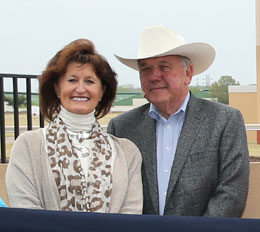- News
- Horse Racing
- Racing Preview
- AQHA Racing Challenge
- Breeding
- Sales
- Quick Stakes Results
- Detail Race Results
- Qualifiers
- Leader Board
- Leading Sires
- Videos
- Auction Leaders
- Q-Racing
Streaming Video
© Dustin Orona Photography

OKLAHOMA CITY, OK—APRIL 23, 2014—Magazine publisher, Ben Hudson has played a long and significant role in promoting Quarter Horse racing not only across the United States, but internationally. He has used the power of the pen to address and promote many racing issues from coast to coast.
Remington Park paddock host, Chris Kotulak, describes Ben as the “Mark Twain” of Quarter Horse racing. “Ben is a sucker for a good story and a good horseman or horsewoman,” Said Kotulak, “For decades, he has passionately covered our sport and industry with sincere, tireless love. His TRACK Magazine and stories have captured that special something that lives within Quarter Horse Racing.”
For the past two years, Ben has served as the out-of-state director representing non-Oklahoma domiciled members on the OQHRA board of directors and Sunday, he was recognized during a feature race at Remington Park for his lifetime of service to our industry.
How did you get your start in the Quarter Horse racing business?
“I started going to the races at Ross Downs (northeast of Fort Worth) and Clear Fork Downs (west of Fort Worth, it became Trinity Meadows) when I was in high school. I was a journalism major in college at TCU and whenever I could get a free choice of subjects for my stories I would use racing for my subjects. After college and a tour of duty with the U.S. Navy I went to work for a racing publication. And then in 1975 we started TRACK Magazine.”
How have you seen racing evolve in the state of Oklahoma?
“I’ve been to Midway Downs, Blue Ribbon Downs, Garfield Downs, Ross Downs and Tulsa before there was ever a Remington Park. And some bush tracks that you could not find with a search warrant now. Remington Park is an amazing place and what the OQHRA has done for racing is incredible. I wish there was some way that someone could figure out how to make the smaller tracks work, but it is very hard.”
You travel to almost every big race and have done so your entire career, what are some of your favorite memories of racing in our state?
“Some of the days at Blue Ribbon were very special. I remember flying on Central Airlines from Dallas to Fort Smith and driving over to Sallisaw. Some of those futurities were very special. I remember Fols Gold winning the first million dollar race in Oklahoma history in 1983. The horse earned more than $540,000 and is not considered a stakes winner by the AQHA. But my best memories are the big crowds during the first two years at Remington Park. That was fun. The old sale at Ada was a lot of fun too. And many of the sales at Heritage. But, overall, it’s enjoying it all with the people. Those are the best memories.”
Throughout your career in our industry, what are some of the changes you’ve seen that you feel have impacted us positively and what changes do you feel have had a negative effect on our business?
“There have been a lot of good things happen . . . things such as Heritage Place. The advancement of our pedigrees. The building of some very nice farms. And the quality of the people involved. The use of shipped semen has turned out to be a good deal when so many of us were very cautious about it at the outset. I don’t have an answer to any of this, but I hate to see the racing so tied to casinos and simulcasting. But that is just a fact of life I would like to see a restriction on the number of embryos that can be registered each year out of any particular mare. And I definitely am against cloning.”
Do you have any predictions for the direction Quarter Horse racing is headed in the next twenty or thirty years?
“It’s really hard to predict five years down the road what will be happening in racing . . . Quarter Horses or Thoroughbreds. I am excited to see new markets open up in Brazil and Florida and Australia. I am concerned about the future of all racing in other spots such as Texas and California.”
Our culture has become so instant gratification driven, what do you feel Quarter Horse racing can do to stay on trend and encourage a younger generation of fans?
“I am not a Facebook or a Twitter person and probably never will be. Don’t know if Twitter is a phone deal or a computer deal and don’t want to find out. If TRACK Magazine needs to do that, I guess I will hire somebody to do it and they can tell me how much good it is doing and how much money it is making. Having said that, I think that tracks need to employ whatever means necessary to get young people to the tracks and involved in racing.”
What is the one piece of advice you would give someone who is just starting out in the race horse business?
“Surround yourselves with good people. Get involved with the OQHRA. Find out who the good guys are and stay pretty close to them.”

 Newsletters
Newsletters Facebook
Facebook